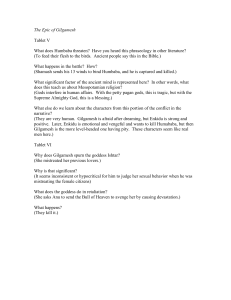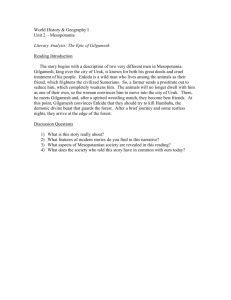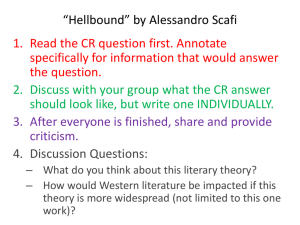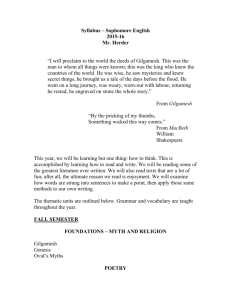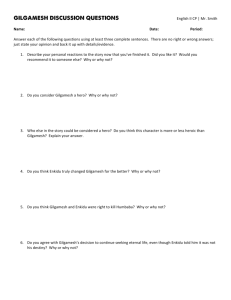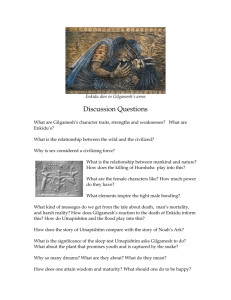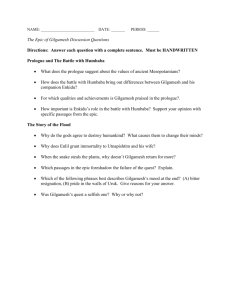Topic 1 Notes - Haiku Learning
advertisement
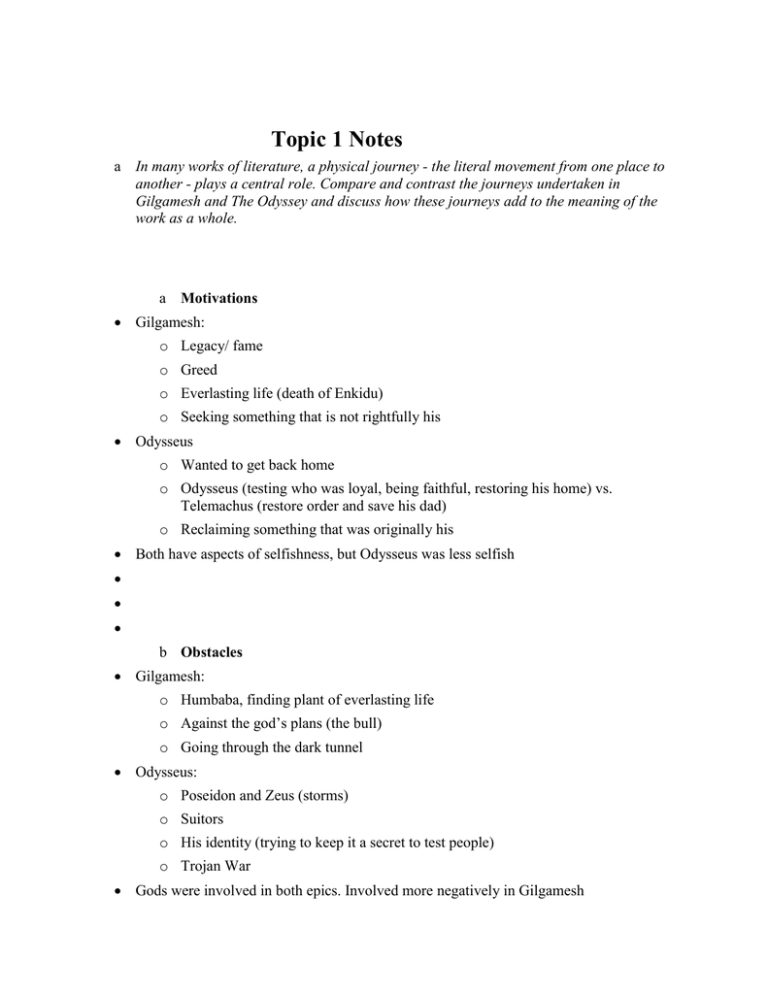
Topic 1 Notes a In many works of literature, a physical journey - the literal movement from one place to another - plays a central role. Compare and contrast the journeys undertaken in Gilgamesh and The Odyssey and discuss how these journeys add to the meaning of the work as a whole. a Motivations Gilgamesh: o Legacy/ fame o Greed o Everlasting life (death of Enkidu) o Seeking something that is not rightfully his Odysseus o Wanted to get back home o Odysseus (testing who was loyal, being faithful, restoring his home) vs. Telemachus (restore order and save his dad) o Reclaiming something that was originally his Both have aspects of selfishness, but Odysseus was less selfish b Obstacles Gilgamesh: o Humbaba, finding plant of everlasting life o Against the god’s plans (the bull) o Going through the dark tunnel Odysseus: o Poseidon and Zeus (storms) o Suitors o His identity (trying to keep it a secret to test people) o Trojan War Gods were involved in both epics. Involved more negatively in Gilgamesh c Results – society vs. individual success (what is revealed about heroism?) Gilgamesh: o Not completely respected (goal not met?) o Doesn’t get everlasting life o Failure based on his standards o Self-centered journey so results only affected him o Became humble and depressed? o Did not gain respect (died alone) o Society: society thinks that heroism is selflessness. Doing things for the good of the community Odysseus: o Changed lives of all suitors o He was successful (returned home and defeated suitors) o Telemachus grew up throughout journey o Hero: killed the suitors (portrayed in a bad way), loyal with crew (loyalty = heroism), leadership qualities, cleverness/ wit Gilgamesh- from home to other location b Wanted to prove strength and power b Set out for a goal and went on a journey on PURPOSE b Goal: was reaching for something he wanted b Fights destiny Odyssey- trying to get home b Already had power, just wanted to go home b Set out for a goal and went on a journey because he HAD to b Goal: trying to regain something he had b Fulfilled destiny Both: b Themes: determination, overcoming obstacles b Want power, but in different ways c Allow for the developed analysis of Odysseus’s and Gilgamesh’s personalities through their decisions and reactions to events that happen during their journeys. Topic 2 Notes 2. Compare and contrast the roles of the gods and goddesses in their either helpful or hurtful interactions with the human world in Gilgamesh and The Odyssey. To what extent are the divine powers responsible for what happens to the mortals? Odyssey Influence: - Very prevalent in the humans lives Almost human like themselves (had conversations etc.) Athena: helpful - Acted as Odysseus’s “guardian” Poseidon: hurtful Gilgamesh Influence: - Not as human like More detached Enlil: helpful : Shamash: he sent wind to bind humbaba – helped Gilgamesh and enkidu defeat humbaba Ishhtar: harmful: lead the bull of heaven to Uruk, caused widespread devastation (hint to the power of gods) when Gilgamesh tried to kill the bull of heaven, she punished Gilgamesh - Enkidu and Gilgamesh attacked and killed the bull without the help of the gods Ea: helpful Ninusn: mother of Gilgamesh Urshanabi: helpful - Took Gilgamesh across the waters of death *Gilgamesh wont marry (---) and so she sends a wild bull to hurt him a Shamash helped Gilgamesh get sacrifices and gave Gilgamesh passage while Ishtar was denied a a a a by Gilgamesh angering her which made her send a bull. Ninsune helped interpret Gilgamesh’s dreams Poseidon hurts with all the storms that drive Odysseus off course Calypso hurt because she forced him to stay on the island Athena was just always there for Odysseus Zeus was neutral because he helped Athena and Poseidon Topic 3 Notes 3. Compare and contrast the roles of the female characters, both mortal and divine, as influences that either help or hurt the epic heroes in Gilgamesh and The Odyssey. Giglamesh Women are powerful mothers and have influence over all of the males (all Goddesses though, no mortal women) Shamat – prostitute that tames Enkidu by seducing him away from his natural state Represents the sensuous refinements of culture and the sophisticated nature of sex Siduri – first bars Gigalamesh out of the tavern but then opens up her world to him advising him to cherish the pleasures of the world The Odyssey Entire story revolves around Odysseus returning to his wife Penelope (has some bit of control over him, although is he coming home to regain control of her?) Women are seen more subservient than the women in Giglamesh Mothers Subservient Servants Not complex Seductresses Athena is the opposite than the rest of the women Dominant Valuable advisor Ends the story as she wants helps him return to Ithaka Kirike – turned the men into pigs Kalypso – wouldn’t let Odysseus leave him Goddesses are superior to males while mortal woman are inferior to both mortal men and Gods. a a a a All females either hurt or helped Athena and Ninsun (mother of Gilgamesh) helped (compare) Circe and Harlet restricted (compare) Kalypso and Ishtar both restricted and asked for the affection of their men (compare) a How are they involved; More in one than another? Talk about the prominence a Although their presence isn’t that bold, they did significantly contribute to the journeys of the characters.
